|
We are about to enter into the holiest days of the Church’s liturgical year, the Easter or Paschal Triduum. The Lenten season, our time of preparation, will fade away into the spiritually intense days ahead. We know the story and how it ends. The disciples and Apostles of Jesus did not know and did not understand. That would come later. While we may know, do we truly understand? We are called to embrace fully and completely in our minds and hearts the basic Christian proclamation, the kerygma, that Pope Francis summarizes in a single sentence:
“Christ, out of love, sacrificed himself completely in order to save you.” (Christus Vivet, 118) Have we done so? We can learn many things from the Catechism or from Theology. We can do good through works of charity and justice. We can participate in many ritual actions of worship. It is all meaningless without trusting faith in Jesus Christ as our loving Savior who has risen from the dead and is alive today! Again, from Pope Francis: “See Jesus as happy, overflowing with joy. Rejoice with him as with a friend who has triumphed. They killed him, the holy one, the just one, the innocent one, but he triumphed in the end. Evil does not have the last word. Nor will it have the last word in your life, for you have a friend who loves you and wants to triumph in you. Your Savior lives.” (Christus Vivet, 126) May you have a blessed Easter Triduum!
0 Comments
Evangelization is a timeless vocation for all Christians. In our modern world, secularism surrounds us and sometimes it feels as though our Church can barely get in a word. Because of this, the current Synod on Young People, the Faith, and Vocational Discernment could not have come at a more needed time. Isaiah 6:8 says, “Then I heard the voice of the Lord saying, ‘Whom shall I send? Who will go for us?’” Isaiah responds, “Here I am…send me!” As the youth of the Catholic Church, we are the present and future of the Church. We are called to exclaim “Send me!” and to spread the Good News of our Lord and Savior, Jesus Christ, yesterday, today, and always! However, it would be foolish if we thought that every young person innately felt and understood this call. The secular world has had an impact on my faith, beginning in my own home. Not every member of my family is a practicing Catholic, which has given my mother and me the opportunity to evangelize in our own house. A prime example of this is praying before meals. I was taught to pray before meals in high school and I continue to do so in college. When I came home for the first time during my first year of college, I struggled to pray before meals because I feared someone noticing me or judging me. Eventually, God gave me the strength to begin to share this prayer with my family and now it is a tradition that we have established together. When he addressed young people at a meeting in the beginning of October (which I attended), Pope Francis said, “Make your way. Be young on the move, looking at the horizons, not the mirror. Always looking forward, on the way, and not sitting on the couch.” Our Holy Father reminds us in these words that our time is now to be consistent in our faith, live the Beatitudes, and serve one another in an effort to help each other grow. “How can I do this?” you might ask. As Pope Francis said, the Synod Fathers will—and have already begun—to answer you. In the synodal document Instrumentum Laboris under the section titled Beyond Secularization, the Synod Fathers speak about the changing view of religion in the secular world. Quoting a Bishops’ Conference, the document states, “Many young people declare that they are looking for the meaning of life, pursuing ideals, searching for their own personal spirituality and faith, but they rarely turn to the Church.” Recognizing that every young person’s path towards the Church is different, the Synod Fathers propose that we focus on the “changed attitude towards religion,” moving away from a “liquid” form of faith to a more concrete belief. Pope Francis uses the same metaphor in his response to the young people at the Synod rally I attended. He said, “Every road you make, to be reliable, must be concrete.” He continues, reminding us that “concreteness is the guarantee to move forward.” Every day, we have concrete encounters with our surrounding world. How can we as Catholics take our faith and make it concrete to those around us? This call from Pope Francis reminded me that my everyday experience of studying in Rome (only a short walk from the Vatican) can be used in my own acts of daily evangelization, especially when I return to the United States. Sharing a concrete experience is “making a gift of oneself and participating in the proclamation of the Good News,” as the Preparatory Document for the Synod states. We, as young people, are the present and future of the Church. She needs us to go out and make a difference. The salvation offered by Christ enables us to rejoice in this world, and the best way to do that is to spread His glory. Be concrete in your faith and you shall “renew the face of the earth.” For more resources on the ongoing Synod, please click here. To learn what it means to be a missionary disciple, please click here. This year seems like a year of baby announcements for me! Just as I have prepared for the parade of invitations and happy save-the-dates for graduations and weddings, I’ve been preparing in my own way for the arrivals of friends’, parishioners’, and family’s little ones. With the arrival of spring, so too comes the arrival of brand new family members. At Mass recently, the choir began singing “What a Beautiful Name” during the Eucharistic procession. I couldn’t help but picture the new names and faces that would fill stories from now on. With each birth announcement came the first, middle, and last name along with weight, length, and time of birth. These surely were moments that changed so many lives forever! I could hear the parents and families singing this song for the new baby boy or girl. As I pictured the new names and faces, I prayed using the name that changed humanity–Jesus. Each verse of “What a Beautiful Name” builds upon the last. Jesus’ name is beautiful, wonderful, powerful. The melody and harmony invite you into a transformative reality. Jesus–who is the King, Savior, Son of God, Prince of Peace–knows your name and is present to you in the Eucharist (CCC 432). You didn't want heaven without us So Jesus, You brought heaven down Throughout the Old and New Testaments, we learn about the significance of names and the process of naming. Some names change as different Biblical figures embrace a new mission or vocation: like Abram, Jacob, and Simon. Listening to this song led me to reflect on those figures in Scripture and on Jesus’ Paschal Mystery in light of the birth announcements. His is the only name through which humanity is saved—the name “above every name.” I hope to witness the love of Christ in these babies and in their unique names that are so meaningful. These names are written on the palms of His hand and show God’s unconditional love for His people and the love for His Son, Jesus. Yours is the Kingdom, Yours is the glory Yours is the Name, above all names This spring and Easter Season calls me to slow down and pray with the name of Jesus. I pray in thanksgiving for new life and new names. I pray for the hearts of these little ones and hope that they come to know and witness the beauty, wonder, and power in Jesus’ name. Question for Reflection: Try praying the simple prayer of Jesus’ name. Think of the history and significance of names in your life, the lives of family members, the saints, and scripture. How have each of these names influenced your faith? “I have no gift to bring…that’s fit to give the king.” -The Little Drummer Boy What do I have to give to the Lord this Christmas? It’s a question I find myself asking as we hum along the Advent season. Amidst the beautiful lights, the Advent wreaths, the Christmas trees, and the dark nights, I turn to different types of Christmas music to help me prepare for the coming of Jesus. I love the enchanting songs and hymns written specifically to prepare us for this season. I love songs like “O Come, O Come Emmanuel,” “What Child is This?” and “O Holy Night.” But lately, as I’ve been reflecting on what I have to give the Lord this Christmas, I think of another of my favorite songs: The Little Drummer Boy. It’s a simple song. A little drummer boy is invited to meet the Newborn King and offers to play for him. It’s a touching story that has become almost like a Lectio Divina meditation of the birth of Christ for me throughout the years. This song places me easily within the scene: a cold, dark night, the smell of strewn hay, the breath of cattle, a humble couple, a group of shepherds, and then, a manger holding Christ Himself: the Creator, the Savior of the World, the King of Kings. In my meditation, I take the place of the little drummer boy. He, like Jesus, is poor and humble. Upon seeing the gifts of the magi and the recipient of the gifts, he reflects, “I have no gift to bring…that’s fit to give the king.” He has no frankincense or myrrh, no gold or silver. He has only himself and his drum. Most of us are like the little drummer boy. The question he asks is the question that resounds in each of our hearts. What could we possibly give to the God of everything? What gift could we bring that’s fit to give the King? The drum of the little drummer boy symbolizes his gifts and talents. It is perhaps his singular greatest treasure. And so, in his humility, with love and tenderness, he offers the Christ Child all he has: a song on his drum. The song almost prefigures the coins of the widow in the Gospel of Mark. The little drummer boy, like the widow, gives his greatest treasure. In response to the widow’s offering, Christ says, “I tell you truly, this poor widow put in more than all the rest.” Christ’s smile in the song of the Little Drummer Boy seems to signify the same. These are the greatest gifts the Lord asks of us: what we hold most dear, the beautiful gifts and talents he has bestowed on us, what makes us ourselves. We love him best, we glorify him best, when we give of ourselves and strive each day to become the man or woman he has created us to be. What can we give the Newborn King this Christmas? Our hard work, our sleepless nights, our chores around the house, the virtues we’re working to perfect, our acts of faith, hope, and love. We can give him our time in prayer, our offerings at Mass, our acts of service to those around us, our talents in art, business, and sports. The little drummer boy’s reward for his performance is the smile of Jesus. What a touching, beautiful reward! It has led me to wonder what I can do for God each day to make Him smile. Imagine if this were what motivated each member of the Body of Christ – what a vibrant Church of missionary disciples we would have! May this be our goal during the Advent season: to make the Christ Child smile in the giving of ourselves. As we continue to prepare for the coming of Jesus on Christmas, I invite you to reflect on what you have to give the Newborn King. What is your drum? What can you do throughout this season to honor Christ? What are a few ways you can make the child Jesus smile? For more resources to guide you through the Advent season, click here. When was the last time you thought about St. Joseph? For many, he is a shadowy figure. And yet, he is recognized as the "protector" of the Church. His feast day is March 19th. What's your image of Joseph? Is he young or old? Is he working or sleeping? Is he rich or poor? Is he strong or weak? We invite you to clear away all those images in order to see him for the first time. Let's meet Joseph as he is presented to us in the Gospel of Matthew at the birth of Jesus. Of course, the best thing to do is to pray with Matthew 1:18-25. Here’s the abbreviated version: Mary and Joseph are engaged. She is expecting. He intends to divorce her quietly but learns, in a dream, that she is carrying a son who will "save his people from their sins" (Matthew 1:21). Joseph is told to accept Mary as his wife and name the child Jesus. In this passage, we see four qualities in Joseph—compassion, righteousness, fidelity, and decisiveness—that make him a saintly man and a role model for us today. Imagine how Joseph felt about Mary's pregnancy. The marriage customs of his day were much different than ours. Were they "in love" or was the engagement arranged? Perhaps Joseph felt more hurt than angry—or perhaps disappointed, given Mary's natural innocence. In any case, he responded with compassion; He did, however, want to do what is right. While he never says a word in the Gospel narrative, Joseph's actions continually say "yes" to God's will. He takes Mary into his home as his wife. He honors Mary's special relationship with God by not having "relations with her until she bore a son" (Matthew 1:25). He claims Jesus as his son by naming him. Joseph lived a quiet fidelity expressed in action rather than words. A kind-hearted man who accepted the mystery of salvation entrusted to him, Joseph adopted Jesus and raised him as his own. He protected him, taught him, and loved him. In the Gospels, Jesus is known as "the carpenter's son." Joseph's love for Mary and Jesus sharpened his awareness of the forces around them. When Herod threatened the life of Jesus, Joseph leapt into action, leaving that night for Egypt. When the threat was gone, he brings Jesus back to his people. When he realized some threat remained, he settled in Nazareth, thus fulfilling a prophecy. His actions were always for the good of Jesus and Mary, and ultimately a part of God's plan for salvation. As we get closer to Joseph, we meet a kind-hearted man, walking humbly with his God, as he accepts, protects, and raises Jesus so that Jesus can "save his people from their sins." St. Joseph can shed considerable light on what it means to be a missionary disciple in an increasingly secular age—with implications for the economy, family, and mission. He plays a quiet, but essential, role in salvation history. Perhaps we, too, have a quiet role to play in salvation history. Perhaps Jesus is relying on us just as he relied on Joseph. Compassion, righteousness, fidelity, and decisiveness can help us live out our role just as they served Joseph. What does the word adoption mean to you? Joseph's vocation began with a dream—a message from God. He is commanded to "rise, take the child" as his own. When we engage the world, do we possess it or does the world possess us? Do we adopt friends, jobs, things—even children, seeing them through the eyes of God? Adoption is a way of being in the world. We are adopted children of the Father in Christ Jesus. We are claimed by God and so we, too, can claim others and make them our own - being possessed in the best sense of the word. Joseph adopted—Jesus, Mary, and his life as a carpenter in fidelity to God who, with and through Jesus, was saving the world. St. Joseph, pray for us.
“She said yes!” is commonly heard in engagement stories, echoing the excitement and joy of making the decision to have one’s life forever complemented with another in marriage. As we prepare to celebrate the Solemnity of the Annunciation on Saturday, the Church rejoices in Mary’s acceptance of God’s place for her in His divine plan of the salvation of mankind. Of course, Mary’s “yes” to God is not the only such instance in Scripture; on the contrary, each protagonist’s story within its pages involves his or her responding to the will of God throughout history, from God’s command to “be fruitful and multiply” to Adam and Eve through his instruction to the exiled St. John the Evangelist to “Write, therefore, what you have seen, what is now and what will take place later.” Just like each person in Scripture, we too can share in the delight of accepting God’s will for us through our faith and the surrendering of our personal desires and wants to Divine Providence. Every book of the Bible recounts at least one instance of God calling a prophet, judge, king, or another figure, no matter their status, to a higher purpose. I particularly enjoy the story of the boy Samuel, whom God called three times before the future judge and prophet, finally understanding Who kept waking him, answered. All of these accounts are more than nice stories—they serve to illustrate the different ways of answering God’s call as well as how God continues to guide us after we answer. The biblical theme still rings true today: “I have called you by name, and you are mine.” On the occasion of the Annunciation, Mary’s “yes” undoes Eve’s “no” to God. Through Mary, the Word was made flesh and she became the new “Mother of the Living” (CCC 489). This motherhood extends to us all! As a result of Mary’s “yes,” she became a tabernacle of the living God now made man. Christ’s complete embrace of humanity during His earthly ministry still affects us today. We are called to allow Him to more fully enter into our lives just as He did in the Virgin’s womb. By creating space for Christ, as Mary did, we are enabled to fully surrender to the Divine Will; our “yes” to God can then echo Mary’s crucial response, “Behold, I am the handmaid of the Lord. May it be done to me according to your word.” How shall we respond? At the Archdiocese of Washington’s Rite of Election this past month, I was blessed to observe over a thousand adults, teens, and children be presented to Cardinal Wuerl in order to be baptized or confirmed as Catholics in the Archdiocese of Washington this Easter. They, like Mary, have said “yes!” to God’s invitation. It’s a beautiful witness to see the participants’ formal expression of their desire to become Catholic before their loved ones, sponsors, and the Church. The Rite of Election kicks off a final period of intense spiritual preparation much like our experience of Lent. This call to conversion, Donald Cardinal Wuerl noted, “is a visible sign that women and men, young and old, from all walks of life, are continuing to respond to our Lord’s invitation: ‘Come, follow me.’” As baptized members of Christ’s Body, we are called to offer our support, love, and prayers for these catechumens and candidates as each continues his or her faith journey, that all may strive to remain close to the Lord Who has called them to Himself. Our “yes!” does not occur in a vacuum. Even the already baptized are called to be a light for each other as each of us experiences darkness in our lives. No matter our insecurities or doubts, no matter our past failings or unworthiness, God still continuously calls to us, ever lovingly, ever patiently, ever gently, ever earnestly. Mary had her own questions when the archangel Gabriel dramatically announced God’s plan for her. If you’re like me, you want all the details before making a decision! But, as we read throughout scripture, one’s trust in God is never misplaced. God can—and does—do great things through us if only we allow ourselves to be like “a little pencil in the hand of a writing God.” May we, then, always share the Good News of Christ’s Resurrection, the hope that we share as we receive Communion, as we journey to the Cross, and as we profess—and experience—God’s love. By the grace of God and the support of each other, may we, at every moment of our lives, join with the whole Church and the heavenly host to praise God for His mercy and goodness: “‘Our Savior, Jesus Christ, has destroyed death, and brought us light and life!’ No wonder we [reply], ‘Alleluia!’” "From starry skies descending,
Thou comest, glorious King, A manger low Thy bed, In winter's icy sting;" ~St. Alfonso Liguori 1732 In a few short days, millions of children will wake up excited to see what is under the Christmas tree. Many will be eager to wake up their families so they can unwrap these gifts. There is a sense of pure joy and excitement that radiates from these children. I have a young Goddaughter, who was explaining to me over Thanksgiving about all the different things she hopes to receive. Her eyes lit up at just the mere thought of Christmas morning. It made me stop and wonder about my own excitement and joy for Christmas. I get caught up in all of the trappings of the season and not the very reason it exists. I started to question if I had that childlike excitement for the birth of our Lord and Savior, Jesus Christ. The more and more I thought about it, the more I realized that I have lost part of that joy. Advent and Christmas provides one the time to stop and think about how the Prince of Peace, the King of Kings, the Messiah, did not come in some powerful show of force or splendor. Rather, God chose quite the opposite. He came to us as a child, born in a manger. The human embodiment of love and mercy came to us in the form of a helpless baby. In the middle of the holiday season, you rarely take the time to stop and think about how perfect that is. Being a godfather has taught me about the amazing ability of a child's capacity to love and forgive. Many a family function, I will walk in and my goddaughter drops what she is doing and runs over to give me a big hug. Her face lights up with joy and excitement. One can only imagine a young Jesus showing the same sort of love to Mary and Joseph. The beauty of this simplicity has inspired the Church for two thousand years. A wonderful example of this is the Christmas Eve Mass at the Vatican. At the end of Mass, the pope carries a small statue of Jesus to be placed in nativity scene as the choir sings the carol "Tu Scendi Dalle Stelle". This carol was written by Saint Alphonso Liguori in 1732 and translated from Neapolitan into Italian by Pope Pius IX. This hymn is about Christ as a child who descends from heaven out of love for us. "Dearest, fairest, sweetest Infant, Dire this state of poverty. The more I care for Thee, Since Thou, O Love Divine, Will'st now so poor to be." I think it is the perfect hymn for these last few days of Advent. For these next few days, I invite you to join me in a quest to be like a child. A quest to seek the joy of Christ's birth of in a pure, whole hearted, and simple way. Pope Francis tweeted about a year ago "to be friends with God means to pray with simplicity, like children talking to parents." For the next few days, as prepare to celebrate the birth of Jesus, let us embrace peace, love, joy, and mercy just like a child who runs to greet you with open arms and an open heart. For more information on Advent, check out our resources and devotional material here. Each year on August 15, we celebrate the Assumption of the Blessed Virgin Mary, a Feast Day commemorating when she was taken body and soul into heaven after her earthly life was completed (CCC 974). By wholly trusting the Lord and following his will, Mary is the most exemplary model we have in living out our faith and trusting in God. We have several instances of the kind of trust Mary displayed toward God: saying “yes” to miraculously giving birth to our Savior, trusting in God’s care of her family when giving birth in Bethlehem, completely trusting in Joseph’s warning from a dream to flee Herod’s lands for Egypt, and placing her trust in God to overcome hardships—especially watching her own son being beaten and dying on a cross. St. Faustina frequently referred to Mary as the model of her life. In her diary, St. Faustina said, “[Mary] believes the words of God’s messenger and is confirmed in trust” (Diary, 1746). St. Faustina would often ask Mary to teach her to continue to trust God even in sorrow, not wanting suffering to break her faith. Trust goes both ways. One of the many reasons God chose Mary to care for his son was because he could trust her as well – in the good times and the bad. We are called to learn from Mary’s example and trust in the Lord, just as he trusts in us. God has a plan for every person, and it is up to us to show our trustworthiness in him and for him. Trust isn’t just about a one-time event. Philippians 1:6 says, “…the one who has begun a good work in you will continue to complete it until the day of Jesus Christ.” Trust lasts our entire lifetime. Trusting in the Lord can certainly be easier said than done. With trust comes obedience to God. This kind of submission takes risk, but God promises us that everything will work out for the good in the end. Trust is the foundation in any relationship. What would happen in our lives if we followed Mary’s example every day, willingly offering ourselves without hesitation to God and his plan for each of us? “Behold the wood of the cross on which hung the salvation of the world.” This line is chanted three times by the celebrant of the Good Friday service; after each time, a covered cross or crucifix is partially unveiled until after the third time when the full cross or crucifix is exposed. The faithful then are invited to reverence the cross, usually with a kiss.
For many, the most memorable part of the Good Friday liturgy is the reading of the Passion Narrative. We are once more transported back 2,000 years to relive the moment when “[God] gave his only Son, so that everyone who believes in him might not perish but might have eternal life” (John 3:16). The moment that has always stood out to me is the Veneration of the Cross. To me, the simple act of embracing the Cross of Christ is one of the most beautiful things one can experience. The Veneration of the Cross has been celebrated in Rome since the seventh century and in Jerusalem since the fifth. It has since become a universal practice in the Church. Many can recall the image of a priest, bishop, and even the pope humbling himself before what was once the symbol of oppression, seeing it instead as a symbol of hope and life. When we embrace the cross and reverence it with a kiss, we in effect adore Christ himself, for the cross is the representation of Christ and his sacrifice. In that act, we then embrace the cross as our own and give ourselves fully to our Lord and Savior. Pope Benedict once remarked, “Entrusting ourselves to Christ, we lose nothing, we gain everything. In his hands our life acquires its true meaning.” Thus, when we embrace the cross, we accept that, through Christ’s sacrifice, we are saved and able to enter into eternal life. We also transform the cross from that instrument of death into the method by which we can now enter God’s heavenly kingdom. As the phrase used in the Stations of the Cross states, “We adore you, O Christ, and we praise you…because by your cross you redeemed the world.” In venerating the Cross of Christ, we make those words active in our own lives. We leave the church on Good Friday knowing that we have reaffirmed our faith in the Lord’s redeeming power. We join ourselves with those who were present at that first Good Friday and believed that the story of salvation did not end that day. In fact, it was only the beginning. And so, when the celebrant chants, “Behold the wood of the cross on which hung the salvation of the world,” let us, with all our heart respond, “Come, let us adore.” For more Lenten Resources, please click here. Victor David is a collaborator with the Catholic Apostolate Center and a staff member at The Catholic University of America in Washington, DC. At the graduate school I attend, there is a simple chapel on the second basement level. I typically find myself the most comfortable sitting in the back of the chapel for daily Mass. One day, I scooted in a minute before Mass started, leaving the only space for me in the front pew (GASP, I know!). As I settled into the pew, I looked up, seeing the front of the chapel much closer and in a new way. In front of me was the reason why sitting in the back was more comfortable. I faced His dislocated shoulders, His God/Man shoulders bloody, His bowed head spurned with thorns, His emaciated figure hanging, His flesh slashed, His knees worn from His falls, His side pierced, and those nailed hands, those feet. I could not keep my eyes from Him and I could not comprehend, “Why?” I get quite used to the pretty crosses, the ones that are bedazzled, the Southern rustic ones, the ornate, or the ones where He is not even present and His suffering can be watered down to a pretty symbol. You could say I get comfortable with them. The Crucifix in this small, simple chapel does not forget His suffering. No, it is displayed loudly, proudly next to the tabernacle, right next to the Eucharistic Table. His sacrifice is not reduced. The scandal of the King hanging on the cross is revered, and yet I worked hard to keep my eyes from the weight of the cross. Later in the day, I found myself in the chapel alone. This time, I slowly made my way up to the large Crucifix. I realized my heart was pounding loudly in my chest. I knelt underneath the Crucifix. I looked up to see His head bowed down. I saw His sacrifice for the first time. And mostly, I was in a disposition of responsibility for the first time, and the weight was crushing. I could not hide. This Lenten season, I am spending more time kneeling in front of this Crucifix, facing my sins and facing my Savior. I encourage you to do the same! You see, by beginning to take in the weight of His sacrifice, the next questions that will arise are, “Why me? Why this sacrifice in this way?” As you ponder His wounds, His shoulders, His crown, His side, His hands and feet, you will hear in a still voice, “Love, Love, Deep Abiding Love for you.” Taking in the shocking death of the Savior only leads us to grasping the true reason of this Lenten journey: the agape love of the Christ. How can we bear our own crosses, the struggles and weaknesses that are a part of the human condition, if we haven’t grasped the passionate love He has for His children? We may try and hide it, water it down, bedazzle it, but the Crucifix is Divine Love thinking of you. “Look into My Heart and see there the love and mercy which I have for humankind, and especially for sinners. Look, and enter into My Passion.” –Jesus to St. Faustina (Diary 1663) For more Lenten resources, please click here. To learn more about the Year of Mercy, please click here. You don’t need to spend a dime to understand Christmas is all about presence. The Church sings, “Emmanuel- God is with us!” God’s gift to the world is his presence, Jesus our Savior. During the holidays, however, life tends to get busy and expensive. Presence yields to presents. When this happens, as it always seems to, I think of Brother Lawrence. Like the great mystic and reformer, St. John of the Cross, Lawrence (1605-91) was a Carmelite monk. But unlike St. John, Lawrence was a lay brother who spent his “unremarkable” life cooking and cleaning. In fact, all that remains are some recollected conversations and a few scattered letters posthumously compiled by another monk into a short, now classic, spiritual work called The Practice of the Presence of God. His conversion happened one winter after “seeing a tree stripped of its leaves, and considering that within a little time the leaves would be renewed, and after that the flowers and fruit appear” (First Conversation) We need Brother Lawrence to remind us that Christmas is all about presence. For Lawrence, this means having a sense of God’s love in the middle of our busy and distracted lives during the Christmas season, a way of “doing our common business purely for the love of God” (Fourth Conversation). He reminds us to be about God’s business during our busyness. Three of Brother Lawrence’s key insights can help us practice the presence of God this Christmas. Give Your Time Christmas is more about being present than buying presents. The most precious gift we have to give someone is our time. As Christmas gets piled high with shopping, decorating, work, or final exams, the gift of time seems to have the highest price tag. Brother Lawrence reminds us that God is present to us in all times and places: "The time of business does not with me differ from the time of prayer; and in the noise and clatter of my kitchen, while several persons are at the same time calling for different things, I possess God in as great tranquility as if I were upon my knees before the Blessed Sacrament.” (Fourth Conversation) The Nativity celebrates the presence of God on earth, a God who came as an unexpected, untimely, and therefore unwelcome stranger. I think we all know people like that! Being present to God may mean letting ourselves be interrupted or making time for a family member we’d rather ignore, and letting God speak. Celebrate Small Things When we think Christmas, we think miracles. But the great mystery of the Incarnation reveals that God also shows his human face in the smallest, most mundane aspects of life. Brother Lawrence says: “We can do little things for God. I turn the cake that is frying on the pan for love of him . . . who has given me grace to work . . . It is enough for me to pick up but a straw from the ground for the love of God" (The Practice of the Presence of God and The Spiritual Maxims). Brother Lawrence points to the presence of God hidden even among life’s most unpresentable circumstances by faithfully doing unglamorous things for God’s glory. Celebrate Symbols It’s tempting to scoff at the more trivialized or sanitized secular symbols of “the holidays.” Rather than spending Christmas railing against materialism, we can imitate the example of Brother Lawrence, who presents a more constructive, creative way to counteract the consumer culture without pointing out other’s shortcomings. Brother Lawrence would turn everyday objects (like pots and pans) into an occasion to praise God. He did this by making them into little actionable reminders. For example, when you see Christmas lights, say, “Christ is my light.” Or pass a snowman and pray for a friend in need. In this way, we “re-symbolize” the world around us. There are a million possibilities. Come up with a few of your own and make it a habit. Especially at Christmas, the whole world is a reminder of God’s love and presence. All of creation is a conversation starter with God, a conversation called prayer, or as Brother Lawrence would say, “the practice of the presence of God.” For more ways to prepare for the coming of the Savior this Advent and Christmas, please visit our Advent Resources page. Much has been made of the so-called Francis Effect in the public relations game the secular media plays with the Church. At first, it seemed a boon to the Church, though the jury is still out as to its lasting impact. But even Pope Francis himself would agree that it is not the Francis Effect that we want in our lives. It is a genuine encounter with Jesus Christ, the Son of God. We want the Jesus Effect.
The name Jesus means “God saves”. We hear these phrases often – “Jesus saves” or “You must accept Jesus as your personal Lord and Savior.” And these things are true. Jesus does save us from the power of sin, and he is very, very personal. He knows each one of us intimately, and longs for us to know him just as well. In coming to know Jesus, we come to know our true selves. We are made in the image and likeness of God. We know this God has revealed himself to be nothing other than LOVE itself. God is love – we read it in John’s Gospel. We are made in the image and likeness of LOVE. When you look in the mirror, do you see LOVE looking back at you? We all try to be loving people. And we know from experience that when we love, we are happier. If we are made in the image of LOVE, then, when we love, we are being our true selves. This is why the more we get to know Jesus, the more we come to know our true selves. We are made to love. We are made to love and to be loved. We are always loved by God – this is what enables us to know how to love others (and to actually do it!). The power of this love is far more powerful than the power of sin. Both powers are more powerful than we are. We easily become “slaves to sin” because, without the power to overcome it, we can only give in to it. But with the power of love – AH. We are no longer slaves – we are free to love, free to be our true selves. You can see why it is so important to be in relationship with Jesus always, to seek him out, and to value every encounter with him. I struggle to find words that adequately describe the power of this love experienced in an encounter with Jesus. Powerful, yes. Safe and secure. Energizing. Liberating. I think depending on where we are in our lives and what challenges we are facing, this love will have a different effect on us. It is interesting to look at some examples from the Scriptures of people who encountered Christ, and ponder the Jesus Effect in their lives. John the Baptist first encounters Jesus while both are still in their mothers’ wombs! When Mary arrives for her visit to Elizabeth, John leaps in her womb – he leaps for joy. He recognizes the presence of Jesus, and is happy – so happy he can’t control himself. He wants to come out and play with Jesus. The joy present in that moment is immense. Can you think of a moment when you encountered Jesus and simply experienced pure and utter joy? This same boy who recognized Jesus from his first encounter becomes the one who facilitates the beginning of Jesus’ ministry to the world. John was baptizing people as they acknowledged their sins, but he was always fully aware that he was merely preparing people for their encounter with Jesus – calling them to repentance so that when the One who could forgive sin and conquer it –really take its power away – arrived, they would be ready to hand over their sins and be purified with love. John knows that Jesus does not need to be baptized for the sake of forgiving his sins – Jesus doesn’t have any! But Jesus tells him to do it anyway. The humility of John to do as he is told by Jesus, even without understanding, is rewarded with the voice of God affirming Jesus’ identity. His encounter with Jesus resulted in a trust in his way. Can you think of a moment when you did something you felt God was calling you to do, even though it didn’t make any sense to you? In our baptism, we die and rise with Christ – united to his Paschal Mystery. Our original sin is washed away – our lives controlled by sin dies, and a new life – freed by love – rises. Our dying and rising is united to Jesus’ death and resurrection – our lives become witnesses to the power of love over sin. Baptism is first a personal union with God – but in becoming personally united to God, we become joined to all the others who are united to God, and we love who are not yet united to God as God loves them. We desire that they, too, will come to know the love of God that we know. We become a community; we become church. Now, just because we are baptized does not mean we are all loving and never sin. We know that’s not true! But God’s love for us is so great that he gives us many opportunities to become reunited to him. The most powerful opportunities are those we are given by participating in the sacramental life of the Church. Baptism brings us into the loving embrace of our God – the rest of the sacraments sustain us in that love. They are genuine encounters with Christ, and they have a Jesus Effect on us. The Jesus Effect is not always one of joy. In Luke’s gospel, we meet someone who encounters Jesus and, instead of leaping for joy, breaks down in tears. The Pardon of the Sinful Woman (Luke 7:36-50) is one of my favorite Scripture passages. Imagine what it must have been like to meet Jesus while he walked the earth. This woman’s response to meeting Jesus was one of utter humility and repentance. The two go hand in hand. You can’t really be repentant without being humble first. Humility enables us to acknowledge that we are not perfect. Humility is the greatest form of honesty, I think. We acknowledge who we are in front of God – not in front of anyone else, not compared to anyone else. It is just our true self – and how well we are being that (or not). Her response to Jesus was so beautiful because in it, she is saddened by her own sinfulness, while being completely overwhelmed by the forgiveness offered to her. Her focus is completely on Jesus. She is not distracted by the others present who speak ill of her. The power of the love of Jesus is so strong that it overshadows their sneers. Imagine that! Can you think of a moment when you encountered the love of God so strongly that it silenced all the negative voices around you, at least in your ears? Now – can you think of a moment when you were that love of God to another? The sacrament of reconciliation is an intense moment of this kind of love, and the season of Lent of a perfect time to encounter Jesus in this way. We can bring anything to confession, and Jesus will give us graces to overcome these temptations. He judges us only to save us – he judges what it is in our lives that is keeping us apart from him – and he tells us to stop doing these things – AND he gives us the grace to do so. He doesn’t leave us hanging. He wants to be intimately united to us. He gives us all we need to do it. This is the Jesus Effect – and it is everlasting. Carmina Chapp is Associate Director of Online Theology Programs for Saint Joseph’s College Online. This blog post was first published on February 11th on the St. Joseph’s College of Maine Theology Faculty Blog. Click here to learn more about our cooperative alliance with St. Joseph’s College Online This past summer, I wrote a blog post on the importance of family. Having just returned from a two week Christmas visit home, I’m again reminded of the importance of love in our lives, especially the love of family. I live in Washington D.C., far away from the majority of my extended family. Most of my 40+ cousins live back in Wisconsin and I now only see them a couple of times each year. As we all grow up, we have become more spread out and family holidays often have significant numbers missing. This year, however, almost everyone made it home for some or all of the many traditional Christmas celebrations. We decorated my grandparents’ house for Christmas, had the chaotic frenzy of opening Christmas presents on Christmas Day, tried to find enough tables and chairs in my grandparents’ basement for Christmas dinner, and raced through the “Round Robin” dinner where we travel from house to house for different courses. I was able to connect with cousins I hadn’t seen since last Christmas, meet the fiancés, boyfriends, girlfriends and new babies who are becoming a part of the ever-growing family.
We see a lot of discussions these days on the “true meaning” of Christmas. We are reminded to keep Christ in Christmas and we can often get lost in the frenzy of the season. What struck me, however, was that celebrating the joy of Christ’s birth was magnified by the people who surrounded me: my family. Christmas is a time where we celebrate our Savior becoming human and coming to us on earth. We do this in many ways; we give presents, have special meals, and unique traditions specific to our families. Being with those we love makes tangible the love of Christ that we celebrate at Christmas. Today’s first reading from the first letter of John says this: Beloved, if God so loved us, we also must love one another. No one has ever seen God. Yet, if we love one another, God remains in us, and his love is brought to perfection in us. As this Christmas season draws to a close, I challenge you to take a moment to reflect on your journey this Advent and Christmas. I hope you were able to spend time with loved ones, be they family or friends. How can you carry this love into this New Year? For as today’s reading reminds us, it is through loving one another that God remains in us. Rebecca Ruesch is the Blog Editor for the Catholic Apostolate Center. Today marks one week until a great man comes to visit us, bringing joy to all. Given the nature of this blog, I’m guessing you think I’m talking about the coming of the newborn Jesus Christ. But I’m actually talking about Santa Claus! The jolly old man himself, bringing loads of goodies on his sleigh to the girls and boys on his twice-checked list. Yes, indeed. What else is special about Christmas? It is interesting to see the secular meaning of Christmas intersect with the glorious birth of our Savior to yield a sort-of confused holiday. The world seems to forget that during this season of Advent when Catholics are preparing their hearts to welcome Jesus on the 25th, many are just preparing themselves to welcome elves and anxiety. This year in particular, I have had to take a step back from all the noise and busyness, and enjoy the peace and joy of this Advent season. Can we still find God with us?
The Gospel today helps us anticipate God’s Promise through faith. In Matthew 1:23, Joseph is visited by an angel to fulfill what the prophets had written, “Behold, a virgin shall conceive and bear a son, and his name shall be called Emmanuel” (which means, God with us). Joseph had extraordinary faith to believe that Mary was filled with the Holy Spirit and that he would care for the One who was being sent to save the world. This was no small feat for a simple carpenter, but Joseph understood the importance of Christ’s birth. This last part of this passage, God with us, caught my ear when I first read it, and reminded me of a Theology class from freshman year in college. We learned that in order to redeem the world from Original Sin, God had to dwell among us on earth. God could only do that by becoming fully Divine and fully Human, and only through a stainless virgin could Jesus be stainless himself. The world has truly been saved because of a small child, born in a stable and laid in manger over 2,000 years ago. Each year we have 4 weeks to ready ourselves for his arrival again. The joy of the season is not packages, ribbons, and bows, it’s realizing that God is here to love us and save us. In my classroom, we have an elf named Chester who comes to visit during the weeks of Advent. He arrived on the first day back from Thanksgiving break, and we have found him in a new spot every morning. According to the book he brought with him called, Elf on the Shelf, he returns to Santa to relay messages about whether or not the kids in my class were naughty or nice each day. Based on this report, my students will have a visit from Santa on Christmas morning. What if instead of Santa visiting us with things, we visited God with full hearts and open arms? Although Chester the Elf is here throughout Advent and will disappear after Christmas, God is always with us. Krissy Kirby is a Kindergarten teacher for the Archdiocese of Washington, D.C. To learn more about Advent, please see our Advent Resources! Having just celebrated the Second Sunday of Advent, we heard in the First Reading from Isaiah how, “Every valley shall be filled in, every mountain and hill shall be made low; the rugged land shall be made a plain, the rough country, a broad valley. Then the glory of the LORD shall be revealed...” What always strikes me about this reading is how the Lord destroys every obstacle in His way, and all that stands against Him is defeated. This alone is important to remember I think, because in the midst of so much activity and stress it is easy to forget that our Lord is always the one in charge and has the power to wash away all of our blemishes and sins. Everything with imperfections is made perfect in Him.
Advent is a time of preparing ourselves for the birth of our Savior and the second coming of Christ. The Church gives us this liturgical time so that we may ensure we are ready for Christ’s entrance into our midst on the Solemnity of the Nativity of our Lord and prepare for how “He will come again in glory to judge the living and the dead.” So, Advent is a time of great hope, expectation, and preparation, but how exactly can we prepare our hearts for Christ? How can the Lord wipe away my own sin, my own imperfections so that I can worthily prepare for His Coming? Partaking in the Sacrament of Reconciliation is a perfect way to prepare our hearts for Christ’s coming and be ready for His arrival. We hear in the Second Reading of this past Sunday how the Lord, “is patient with you, not wishing that any should perish but that all should come to repentance.” The Lord never tires of extending forgiveness to us, He is ever merciful. He wants the best for all of us, even when sometimes we don’t know exactly what that is. Just as in Isaiah, the Lord defeats and washes away all of our sins and imperfections with this wonderful Sacrament. Pope Francis during one of his Wednesday audiences said, “every time we go to confession, God embraces us.” With all of the different parties and events during this time of year, with all the invitations, there is one invitation that you should be certain to consider. The Lord has already extended to us the invitation, an invitation that prepares us for Christ’s coming by partaking in the Sacrament of Reconciliation. The question is - will you accept it? Conor Boland is a College Ministerial Intern at One Bread, One Cup and is an undergraduate at The Catholic University of America. For more information on Reconciliation and the Advent season, please see our Advent Resources! |
Details
Archives
July 2024
Categories
All
|
About |
Media |
© COPYRIGHT 2024 | ALL RIGHTS RESERVED

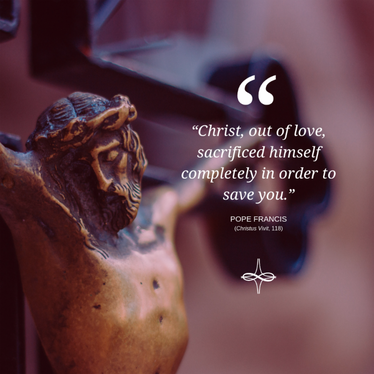
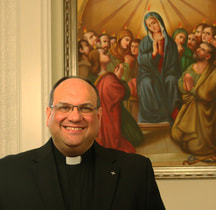
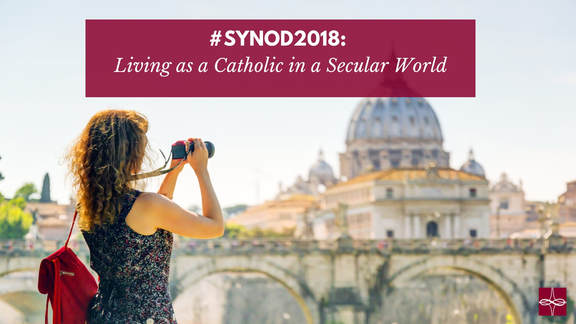

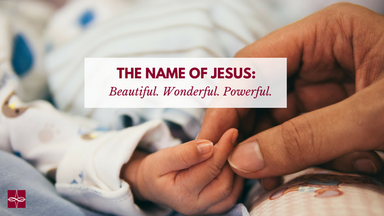

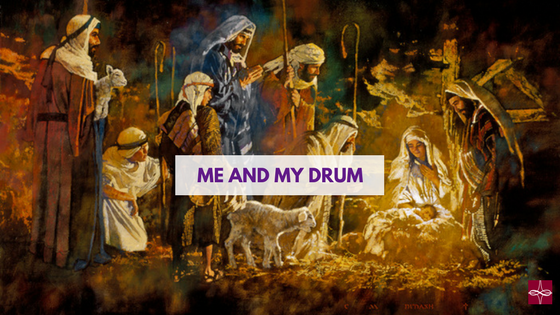

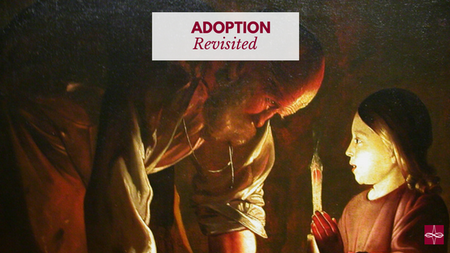

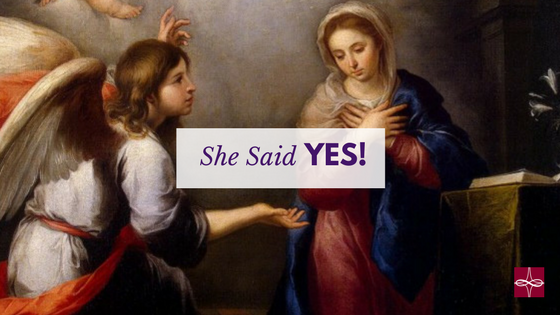

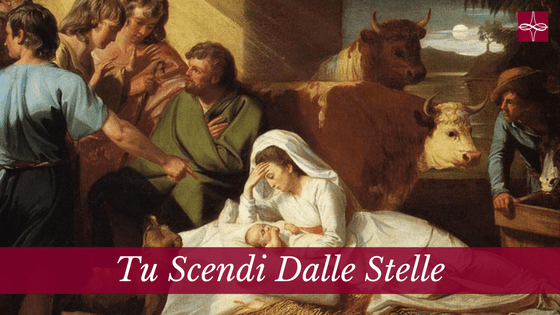

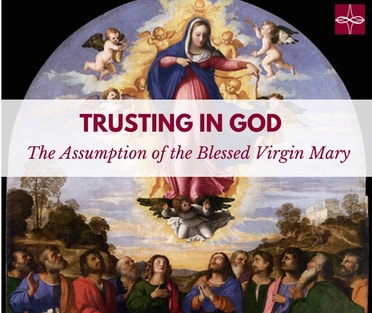

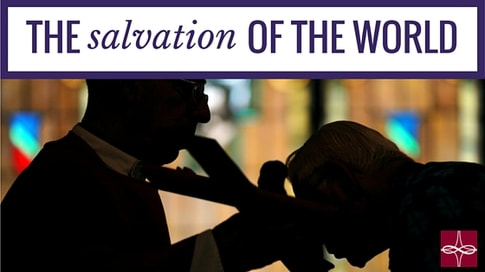
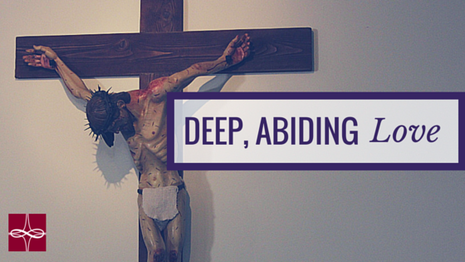

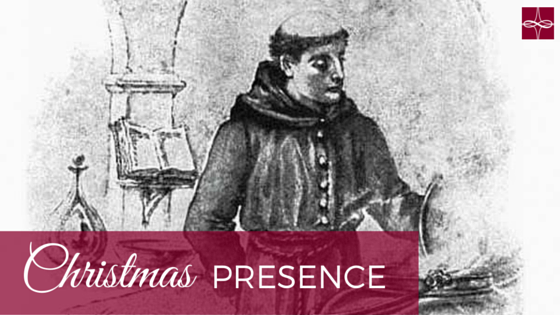

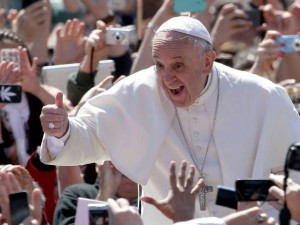



 RSS Feed
RSS Feed